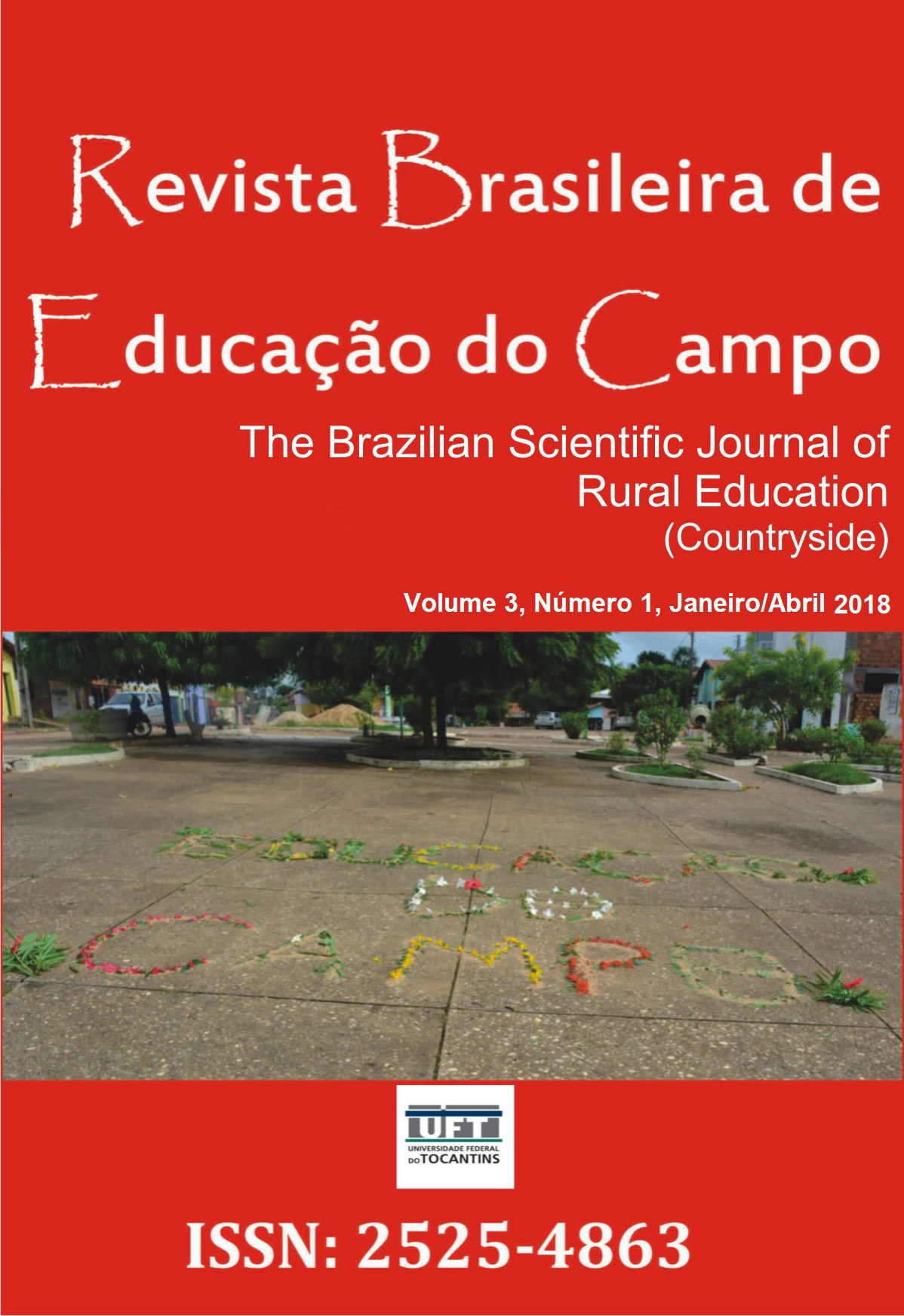Notes on Rural Education in Colorado do Oeste/Rondônia: notes of a literate peasant
DOI :
https://doi.org/10.20873/uft.2525-4863.2018v3n1p313Résumé
Abstract. This paper will address concerns about the dichotomy between Education in the countryside and Rural Education. Based on the theoretical reference reading, we decided to confront what we know of the Brazilian educational system, with the reality we experienced and, in addition, to confront the official discourse of plural education with the desire and need of social movements for a more dignified education. The social movement chosen for our analysis was the Small Farmers' Movement (MPA), as it is a movement of wide reach and support in our region. For this we elect a person who is part of the movement to carry out a semi-structured interview. The interviewee is graduated in a course directly involved with Education which also gives him theoretical background to discuss this topic. According to the data collected the people of the MPA believe in a better educational system, and this improvement goes through the dialogue between the State and Social Movements. In the case of the MPA, this dialogue has as its central idea the valorization of the peasant culture within the school environment and, the guarantee of the maintenance of the rural schools can thus help to reduce the rural exodus and consequently to improve the quality of life.
Téléchargements
Références
Araújo, M. E. B. (2015). A vida e a produção no Assentamento Margarida Alves em Nova União. (Dissertação de Mestrado). Universidade Federal de Rondônia, Porto Velho.
Ausubel, D. P., Novak, J. D., & Hanesian, H. (1978). Educational Psychology: A Cognitive view. Nova York: Holt, Rinehardt & Winston.
Batista, J. A. (2016). Adoção da agricultura de precisão na Amazônia: Estudo de caso na região cone sul do estado de Rondônia. (Dissertação de Mestrado). Universidade Federal de Santa Maria, Santa Maria.
Brasil. Lei nº 9.394, de 20 de dezembro de 1996. (1996, 23 de dezembro). Estabelece as Diretrizes e Bases da Educação Nacional. Recuperado de: http://www.senado.gov.br/sf/legislacao
Constituição da República Federativa do Brasil. (1988, 05 de outubro). Recuperado de: http://www.senado.gov.br/sf/legislacao/const/
Caldart, R. S. (2012). Educação do Campo. In Caldart, R. S., Pereira, I. B., Alentejano, P., & Frigotto, G. (Orgs.). Dicionário da Educação do Campo (pp. 259-266). Rio de Janeiro, RJ: Expressão Popular.
Delizoicov, D., Angotti, J. A., & Pernambuco, M. C. A. (2003). Ensino de Ciências: Fundamentos e Métodos. São Paulo, SP: Editora Cortez.
Gil, A. C. (1999). Métodos e Técnicas de Pesquisa Social. São Paulo, SP. São Paulo, SP: Atlas S. A.
Görgen, F. S. A. (2009). Agricultura camponesa. Santa Cruz do Sul, RS: Cadernos de Estudos Cooperfumos.
Gramsci, A. (1991). Concepção dialética da história. Rio de Janeiro, RJ: Civilização Brasileira.
Kolling, E. J., Néry, I., & Molina, M. C. (1999). Por uma educação básica do campo (memória). Brasília, DF: Articulação Nacional por uma Educação do Campo.
Kolling, E. J., Cerioli, P. R., & Caldart, R. S. (2002). Educação do campo: identidade e políticas públicas. Brasília, DF: Articulação Nacional por uma Educação do Campo.
Luiz. (2017). Apontamentos sobre educação. Colorado do Oeste, Rondônia. Entrevistadores: Marcos Antonio Oliveira Rodrigues, Vanessa Campos Moraes e Raiane Agustinho Lopes.
Martins, F. J. (2009). Educação do Campo: processo de ocupação social e escolar. In Congresso Internacional de Pedagogia Social. Recuperado de: http://www.proceedings.scielo.br/scielo.php?pid=MSC0000000092008000100006&script=sci_arttext
Marx, K. (2004). O Capital. Crítica da Economia Política. Rio de Janeiro, RJ: Civilização Brasileira.
Marx, K., & Engels, F. (2007). A Ideologia Alemã. São Paulo, SP: Boitempo.
Mészáros, I. (2008). A educação para além do capital. São Paulo, SP: Boitempo Editorial.
Movimento dos Pequenos Agricultores (2017). Quem somos. Recuperado de: http://www.mpabrasil.org.br
Petty, M., Tombim, A., & Vera, R. (1981). Uma alternativa de educação rural. In Werthein, J., & Bordenave, J. D. (Orgs.). Educação rural no Terceiro Mundo (pp. 31-64). Rio de Janeiro, RJ: Paz e Terra.
Pistrak, M. M. (2011). Fundamentos da escola do trabalho. São Paulo, SP: Expressão Popular.
Ribeiro, M. (2001). Trabalho cooperativo no MST e ensino fundamental rural: desafios à educação básica. Revista Brasileira de Educação, 17, 20-39. DOI: http://dx.doi.org/10.1590/S1413-24782001000200003
Souza, W. K. A., Fernandes, A. B. V., Chichoki, M. V., & Bairros. (2015). Agricultura familiar: discutindo as concepções a partir de saberes e experiências. In anais do X Congresso Norte Nordeste de Pesquisa e Inovação, Rio Branco - Acre.
Thompson, E. P. (1981). A miséria da teoria ou um planetário de erros: uma crítica ao pensamento de Althusser. Rio de Janeiro, RJ: Zahar Editores.
Thompson, E. P. (1998). Costumes em comum: estudos sobre a cultura popular tradicional. São Paulo, SP: Companhia das Letras.
Williams, R. (1989). O campo e a cidade na história e na literatura. São Paulo, SP: Companhia das Letras.
Téléchargements
Publié-e
Comment citer
Numéro
Rubrique
Licence
Proposal for Copyright Notice Creative Commons
1. Policy Proposal to Open Access Journals
Authors who publish with this journal agree to the following terms:
A. Authors retain copyright and grant the journal right of first publication with the work simultaneously licensed under the Creative Commons Attribution License that allows sharing the work with recognition of its initial publication in this journal.
B. Authors are able to take on additional contracts separately, non-exclusive distribution of the version of the paper published in this journal (ex .: publish in institutional repository or as a book), with an acknowledgment of its initial publication in this journal.
C. Authors are permitted and encouraged to post their work online (eg .: in institutional repositories or on their website) at any point before or during the editorial process, as it can lead to productive exchanges, as well as increase the impact and the citation of published work (See the Effect of Open Access).














